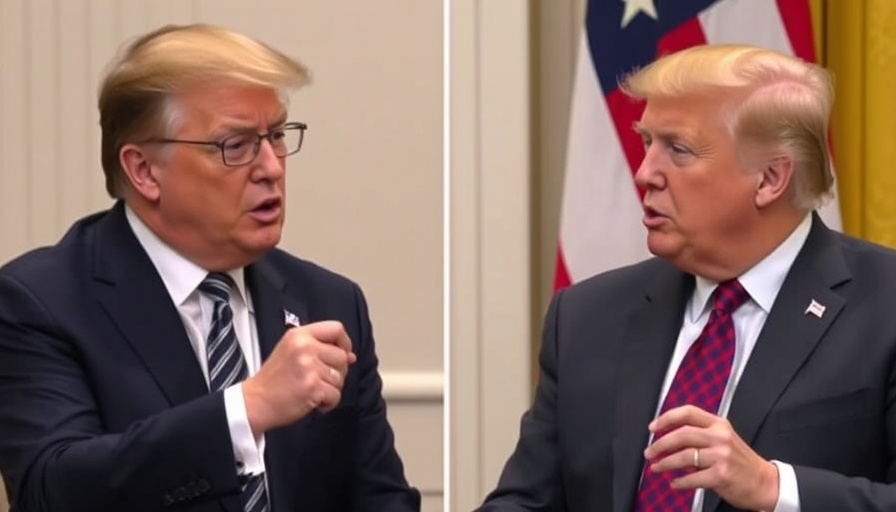
Stephen Colbert Dissects the Chaotic Trump-Zelenskyy Meeting
In a recent episode of The Late Show, Stephen Colbert offered his biting commentary on the tumultuous meeting between former President Donald Trump and Ukrainian President Volodymyr Zelenskyy, a confrontation that has left both political analysts and late-night comedians reeling. Described by Colbert as "embarrassing, chilling, and confusing," the meeting, which unfolded in the Oval Office, was marked by an aggressive exchange that starkly contrasts with longstanding U.S. foreign policy.
A Diplomatic Tornado in the Oval Office
The significance of this meeting cannot be understated; it symbolizes a potential seismic shift in U.S. foreign relations. Colbert highlighted how within just 10 minutes, Trump appeared to dismantle nearly eight decades of postwar foreign policy that had been built on principles of democracy and alliances with European nations. "In just 10 minutes, Donald Trump reversed 80 years of postwar U.S. foreign policy," Colbert pointed out, as Trump went on the offensive, blaming Zelenskyy for the ongoing war that has engulfed Ukraine.
While the White House setting is typically reserved for serious diplomatic discourse, this encounter quickly escalated into a shouting match, a situation so unusual it sparked widespread concern across European leadership. In light of Trump's aggressive stance and the apparent disrespect shown to Zelenskyy, many European officials are now left grappling with the implications for their own countries’ security and alliances as they rally in support of Ukraine.
The Aftermath: A Ripple Effect Across Europe
Following the contentious meeting, European leaders voiced alarm over the potential destabilization of their long-standing alliances. As noted by various analysts, including ABC News, the imagery of Trump publicly berating Zelenskyy sent shockwaves through Europe, leading to a diplomatic tsunami of uncertainty. Europe's top diplomat, Kaja Kallas, emphasized the urgent need for the EU to step up its support for Ukraine in light of these latest developments. “It is clear that the free world needs a new leader,” she asserted, highlighting a growing concern about the U.S.'s commitment to supporting Ukraine amidst rising Russian aggression.
Zelenskyy’s Argument: An Asymmetric Power Play
Zelenskyy did not back down during the confrontation, challenging Vance and Trump on their established narrative. As he pointedly remarked, “During the war, everybody has problems, even you,” referring to the disconnect between the U.S. leaders and the realities facing Ukraine. The intense back-and-forth showcased not just the immediate frustrations of Zelenskyy but also the broader implications of U.S. policy as he stressed the importance of holding Putin accountable, calling past agreements meaningless when they have not been adhered to by the Russian president.
Public Discourse and the Media’s Role
The media's portrayal of the incident has also been revealing. Colbert and fellow late-night hosts like Seth Meyers used humor to criticize the aggressive rhetoric from Trump's camp, illustrating the absurdity of the demands placed on Zelenskyy to express gratitude for military aid, even as his country faces existential threats. This push from Vance for thankfulness mirrors troubling historical tendencies where victors lay claims or impose rhetoric on the narrative of conflict, often sidelining the voices of those most affected.
Future Predictions: The Democratic Front
If Trump continues to navigate U.S. foreign policy in this fashion, the implications for Ukraine could be dire. Analysts fear that diminishing military aid and support could embolden Russia, leading to intensified military aggression against Ukraine. Zelenskyy’s calls for a more nuanced understanding of Ukraine's plight reflect a critical moment in global diplomacy where clarity and genuine support are desperately needed. As tensions escalate, the importance of coherent, supportive alliances through Europe becomes increasingly paramount.
Rethinking U.S. Foreign Policy
Colbert left us with a crucial reflection on the current state of international relations: “Our friends are now our enemies, our enemy is now our friend.” Understanding the implications of this shifting landscape offers insights into whether the U.S. can still function as a stabilizing force or if it risks alienating both allies and adversaries throughout the next chapters of European security.
As digital nomads passionate about global culture and politics, it’s essential to keep our eyes on these developments. The very fabric of international relations can shift overnight, reshaping not only the political landscape but also influencing travel, culture, and societal narratives worldwide.
This troubling episode highlights the urgent need for a more balanced and diplomatic approach moving forward. For those invested in learning about the history and culture of different nations, understanding such geopolitical intricacies can enhance our appreciation of international friendships and alliances that have historically guided global interactions.
 Add Row
Add Row  Add
Add 




Write A Comment